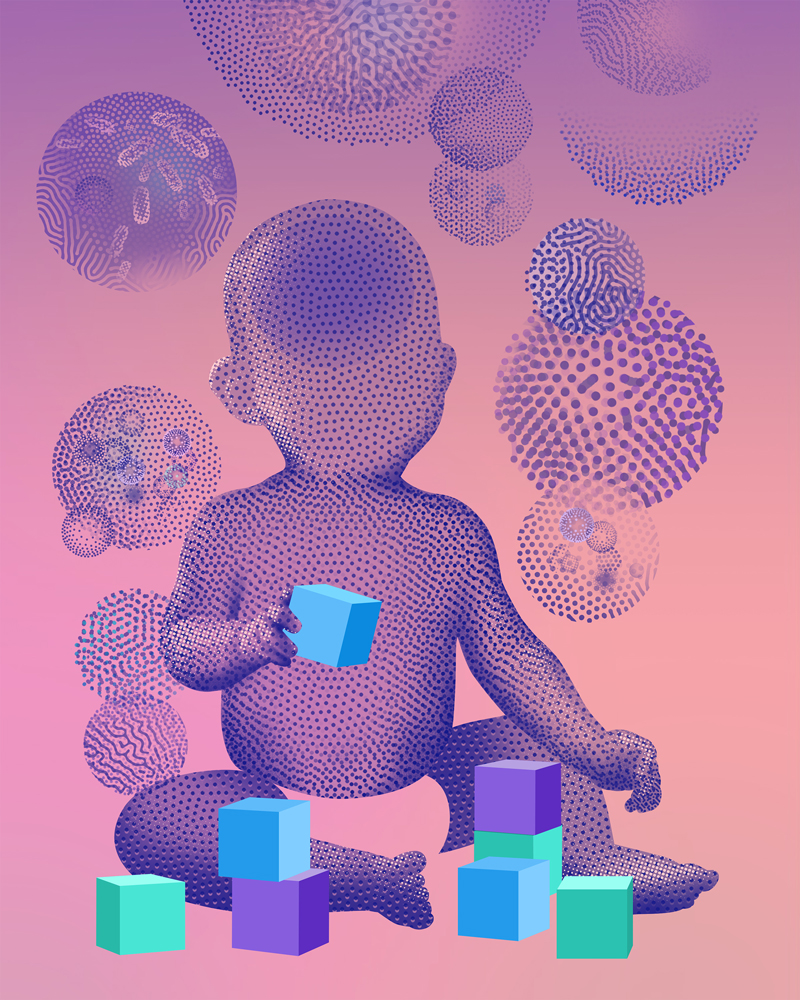Reach 2024: Babies, Bugs & Brains
By Liz Do
Illustration by Phil Wheeler
What can we learn from studying bacteria in babies? Researching their “bugs” may hold key learnings on the mysterious gut-brain axis. Here’s what we know about its impact on neurodevelopment and human health.

Growing evidence suggests that the bacteria living in our gut can affect our brain development and health. However, the definitive mechanisms linking them — the gut-brain axis — remain a mystery.
“Obviously, there aren’t brain microbes burying in and making you sick. But microbes in our gut have to be sending something, a message, to the brain,” says Brett Finlay, Co-Director of the Humans & the Microbiome program.
Breakthroughs in the gut-brain axis hold the potential to improve lives in areas from mental health, to digestive health, to immune function.
As researchers from across the globe probe the connection at the heart of this scientific unknown, some are turning to our earliest experiences to gain insights.
So far, we know that gut microbes are capable of producing neurotransmitters, such as serotonin and histamine. Microbes also tightly interface with the immune system — causing inflammation, for example — which can then affect brain function. There is also the vagus nerve, where signals wander up and down the gut and brain, helping to control heart rate, digestion and even how we feel.
“We’ve been seeing more and more evidence in adults that aspects of the microbiome are important for brain function, but there wasn’t much at all on early development.” — Laurel Trainor

Photo courtesy of the researcher
“There’s a lot of thought around this, that microbes are somehow tying into the signals along this nerve ending,” explains Finlay, who is a professor in the Michael Smith Laboratories at the University of British Columbia. Finlay has spent his more than 30-year career studying disease-causing microbes, such as E.coli, to develop better tools to treat infection.
Though the linkage is clear and scientists have made significant progress in understanding the gut-brain axis, the complex nature of the nervous system and the staggering diversity of the human gut microbiota — which varies greatly based on a person’s diet, genes and environment, to name a few — makes understanding the intricacies a big challenge.
Leading the way in gaining new insights are CIFAR researchers such as Finlay and Laurel Trainor, a Fellow in the Brain, Mind & Consciousness program and a professor of Psychology, Neuroscience and Behaviour at McMaster University.
After a joint meeting between the two CIFAR programs sparked a collaboration, they, alongside former CIFAR member Janet Werker, published a study that looked at different types of gut bacteria present in infants and how this connects to their early cognitive development.
“We’ve been seeing more and more evidence in adults that aspects of the microbiome are important for brain function, but there wasn’t much at all on early development,” said Trainor, a cognitive psychologist studying perception, cognition and the neuroscience of music.
“So we were interested in looking at whether the state of an infant’s early microbiome is related to their cognitive and brain development. It’s an exciting question because if it is, then it suggests that certain interventions might optimize an infant’s developmental trajectory.”

Photo courtesy of the researcher
“...there aren’t brain microbes burying in and making you sick. But microbes in our gut have to be sending something, a message, to the brain.”— Brett Finlay
They collected fecal samples from 56 infants between four and six months old and analyzed the bacteria using a method called shotgun metagenomic sequencing. In parallel, they measured the abilities of the infants’ brains to track rhythms and discriminate between forward and backward speech, as well as their abilities to engage in what’s known as social joint attention — when two individuals jointly focus on a moment or object.
The results showed that infants whose brains were better at tracking rhythms and who showed better joint social attention tended to have certain types of bacteria in their guts that could influence neurodevelopment.
Overall, the study suggests that the gut bacteria in infants might play a role in how their brains grow and work, but more research is needed to be sure. That’s why Finlay and Trainor plan to expand their work going forward, including studying the microbiome of premature babies.
“Our study was a small proof of principle. So can we replicate it? We had some hints of things, but we would need a lot more data to really nail everything down,” says Finlay.
Another CIFAR researcher studying the gut-brain axis and its impact on development is Thomas McDade, Co-Director of the Child & Brain Development program.
McDade, a professor in the Department of Anthropology at Northwestern University, is interested in studying how experience becomes biology — how where we live, who we live with and the communities we grow up with get embedded in our genomes. McDade then looks at how these factors affect our physiological systems and ultimately, how it affects our mental and physical health as we become older.
“Early on in my career, I learned that there are different ways to think about the body and not just how it becomes diseased, but how it functions in response to the environments we grow in,” explains McDade.
“What if the intensity and diversity of microbial exposures you had as a baby predicted your trajectory of cognitive aging?”— Thomas McDade

Photo courtesy of the researcher
In particular, he’s interested in inflammation. Inflammation is an important part of our body’s innate defenses against infection and helps our bodies heal when they become injured. But it’s an incredibly potent system — if our inflammatory responses become overblown or chronically activated, they can cause damage, including to the brain and other systems.
“We are coming to realize that inflammation underlies a lot of chronic degenerative diseases, like cardiovascular and metabolic diseases, as well as Alzheimer’s disease and other dementias — they all have an inflammatory component,” explains McDade.
His recent work has focused on studying the diversity of microbial exposures in infancy, as well as nutritional factors like breast-feeding, and its effects on aging and brain health.
One major project of McDade’s has been ongoing since 1983, involving the study of 3,000 pregnant women in Cebu, Philippines. They lived in various environments, from wealthy areas to low-income settlements. Now, their kids are around 40, and McDade is studying how microbial exposures in their early lives has affected their health and cognitive aging.
He hopes this work opens up our understanding of how inflammation and early microbial exposures affect cognitive diseases such as Alzheimer’s, Parkinson’s and dementia.
“If dysregulated inflammation contributes to cognitive aging and brain health, then it’s important to understand how inflammation is regulated,” says McDade, who is excited by the future impact of his work and the many studies unraveling the gut-brain axis.
“What if the intensity and diversity of microbial exposures you had as a baby predicted your trajectory of cognitive aging? I mean, it’s not hard to connect those dots. And that’s where I think the field is moving.”
Related Articles
-
Bugs, Babies & Brains
June 13, 2024
-
How do we create a google map of the human body?
June 13, 2024
-
How does the brain give rise to the mind?
June 13, 2024
-
A day with Kristin Andrews
June 13, 2024